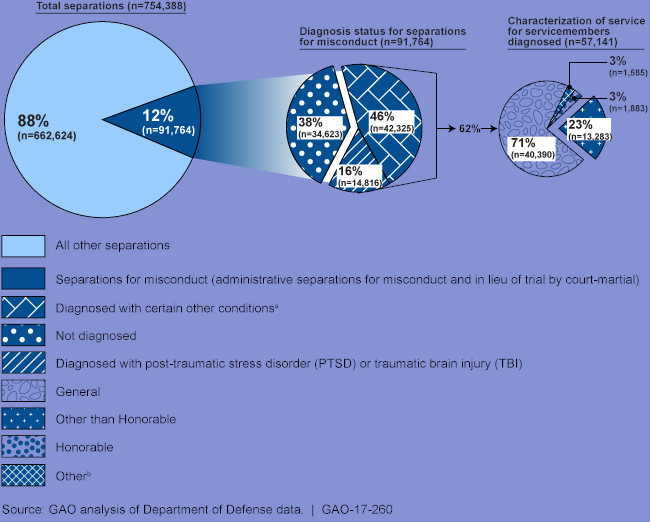Less-Than-Honorable Discharges Common With PTSD, TBI
NEW HAVEN, CT — Tens of thousands of less-than-honorably discharged veterans will have an easier avenue to have those discharges reconsidered and possibly adjusted, making it more straightforward for them to access VA services.
That has been made possible by the resolution of a class action lawsuit was filed in 2017 by the Yale Law School Veterans Legal Services Clinic on behalf of two Army veterans, Stephen Kennedy and Alicia Carson, who alleged they were denied honorable discharges due to underlying mental health issues incurred during military service. The suit also alleged that the Army Discharge Review Board (ADRB) unlawfully denied discharge upgrades to the two veterans by not following a 2014 rule that requires records-corrections boards to give special consideration to post-traumatic stress disorder diagnoses and consider such diagnoses potentially mitigating factors in any misconduct that led to a less-than-honorable discharge.
A year after the filing, a judge granted a motion by the plaintiffs to certify a nationwide class for the purpose of the suit—veterans who were discharged from the Army with a less-than-honorable service characterization after Oct. 7, 2001, who have not received discharge upgrades and have diagnoses of PTSD, traumatic brain injury, military sexual assault or related conditions. As many as 150,000 veterans could fall under this umbrella.
That same year, the judge also denied the secretary of the Army’s motion to dismiss the case.
In the settlement reached last month, the Army agreed to automatically reconsider those less-than-honorable discharges that occurred between 2011 and 2020 and to send individual notices to veterans who were discharged from 2001 to 2011 informing them they will be eligible to reapply to the ADRB.
The Army also will adopt procedural reforms to allow veterans seeking a hearing with the ADRB to do so over the phone rather than appear in person, making accessing discharge upgrades easier.
“This is a watershed vindication of veterans’ rights,” said Kennedy, who served in Iraq and is a founder of the Connecticut chapter of the Iraq and Afghanistan Veterans of America. “Not only will this have a practical impact on the lives of thousands of veterans, but this settlement will also signal that the federal government must be held accountable to its word to veterans.”
PTSD and Discharge
The case was bolstered by a 2017 Government Accountability Office report which found that military services had been inconsistent in considering PTSD in its discharge classifications and in discharge reviews. The report found that 62% of the 57,141 servicemembers separated for misconduct from 2011 through 2015 had been diagnosed within two years prior to separation with PTSD, TBI or other conditions that could be associated with misconduct. Of those, 57,141, 23% received an other-than-honorable discharge.
Regarding the Army specifically, GAO investigators found inconsistent screening for PTSD and TBI, inconsistent training of officers to recognize symptoms and inconsistent counseling of servicemembers on their rights prior to separation.
Veterans who have not received an honorable discharge, commonly referred to as “bad paper” veterans, frequently have difficulty accessing benefits and care following military service. A veteran with a less-than-honorable discharge is not immediately excluded from VA care, but VA is required to conduct individual reviews to see whether family or mental health conditions created mitigating circumstances that led to the veterans’ discharge. If so, the veterans might still be able to receive treatment for service-related conditions.
Veterans rarely understand that such a review is possible, however, according to a report released this past spring by the Yale Veterans Clinic. It found that VA staff also did not always understand that such a review is possible, with the result that veterans who could be eligible for VA care are regularly turned away because of their unreviewed discharge status.
In addition, even if veterans receive a hearing with VA, that does nothing to impact their discharge status and could still result in only limited VA benefits. Only a discharge review board hearing and subsequent adjustment to their discharge status can guarantee full benefits.
Included in the settlement are other reforms designed to ensure that veterans suffering from PTSD and other mitigating conditions are properly assessed or reassessed in the future. That includes having the Army conduct annual training for ADRB members specifically tailored to the issues presented by applications that contain evidence of PTSD. The ADRB also agreed to include new language into its operating manuals and decision documents that require in-depth consideration of mental health factors.
The settlement also means Army will now notify all veterans who apply to the ADRB that they have a right to seek legal and medical services to help with their claim and will provide guidance on how they can obtain them.
Before the settlement is finalized, class members will have the opportunity to comment on the terms of the agreement in a fairness hearing before the U.S. District Court for Connecticut.



